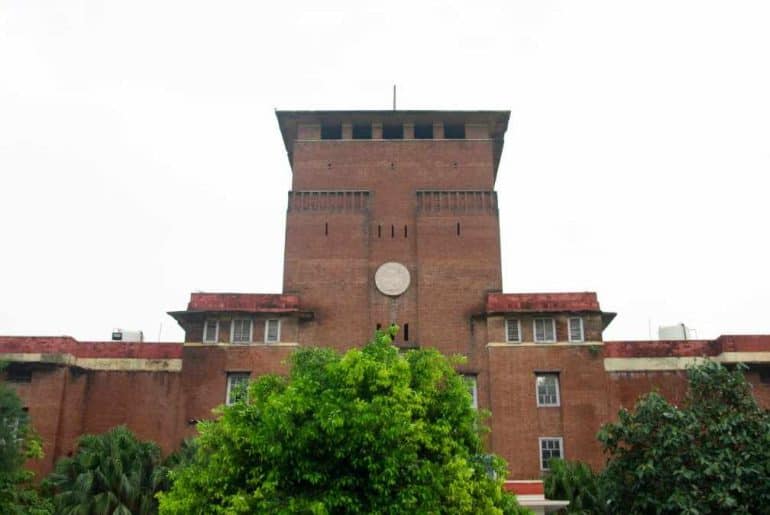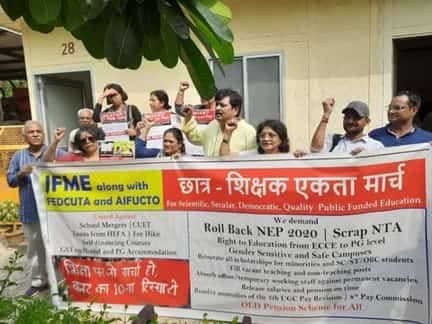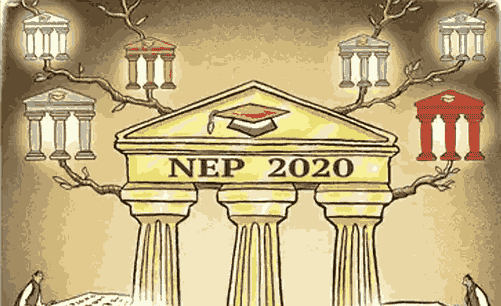As Delhi University’s four-year undergraduate programme enters its final year for the first batch under NEP 2020, students are met with confusion, institutional silence, and uncertainty over its value.
NEP 2020 had big dreams for education. It promised, among other things, a “more multidisciplinary undergraduate education.” Flagging the “lesser emphasis on research at most universities and colleges”, the policy framed research as the hallmark of a “great civilisation.”
To fulfil this vision, the four-year undergraduate programme (FYUP) was introduced. The new curriculum offers students the option to choose between three specialisation tracks in their final year – Dissertation Writing, Academic Projects, and Entrepreneurship. The first track is designed for those pursuing academic research, the second focuses on applied research, while the third allows students to develop entrepreneurial ideas. These components, worth 12 credits collectively, are meant to usher in undergraduate research as a formal part of the academic journey.
Delhi University was among the first central universities to implement the FYUP under NEP 2020, beginning in the academic year 2022–2023. The reimagined structure was presented as a transformative space to cultivate holistic, multidisciplinary inquiry, with the four-year format being positioned as the preferred option, offering students the opportunity to pursue a major alongside minors, engage in research, and explore broader intellectual horizons.
However, it seems to be that within its inaugural batch there is a general consensus that this ambitious experiment will promptly fall short of what it envisioned. Anecdotal evidence from students across colleges suggests that a significant number are choosing not to continue into the fourth year. While Delhi University has not released official enrolment statistics yet, student testimonials across different colleges and universities show a similar pattern of hesitancy and concern.
After graduating students have a few options. They typically pursue placements, graduate studies or prepare for competitive exams. The added fourth year has only intensified these pre-existing dilemmas, introducing a new layer of uncertainty.
For students interested in research, the fourth year appears redundant. The conventional path of a three-year bachelor’s followed by a two-year master’s continues to be the preferred model. Some students argue that it won’t match the depth and rigour of a two-year masters. Others are more cautiously optimistic. Tia Pandit, a Physics (Hons) student from Kirori Mal College, sees her decision as a calculated move to improve her chances of being accepted into postgraduate programs abroad. The capstone thesis and a minor in CS will, she believes, give her the academic depth many international universities look for.
Yet even those inclined toward research worry that the year may not deliver the value it promises. Khushi Aggarwal, an Economics (Hons) student from Hindu College, remarked,
DU often promises more than it delivers. For instance, it previously mentioned that under the NEP framework, internship opportunities would be provided in place of VACs or something similar, but that didn’t materialise.”
A principal from a prominent North Campus college told The Indian Express that students are at a crossroad, stating, “From a student’s perspective, there are now two choices – either exit after the third year and prepare for CUET-PG or CAT, or continue with the fourth year.“ He failed to take into account the fact that the students might just treat the fourth year as their preparatory gap year.
Aakriti Singh, a journalism student from Kamala Nehru College, asserted that it’s better to pursue a research degree rather than staying idle alongside preparing for exams. Similarly, Sreeja from Gargi College revealed,
More than half of my class is opting for the fourth year just because they couldn’t get better institutes for masters. All of us plan to study better for entrance exams this year rather than taking a gap year to go for masters next year.”
Sarah Nautiyal, a BA (Hons) English student from Kirori Mal College, noted that most students, including her, see this period as a “gap year with benefits”. She emphasised that her decision to stay was influenced a lot more by the faculty because of whom the year “won’t be a complete waste”.
This batch has already endured multiple institutional changes, from the introduction of CUET to the rollout of new course components like VACs and SECs, but the fourth year stands out for its sheer lack of clarity and institutional preparedness. There is near-unanimous agreement among students that colleges failed to adequately explain this entirely new system.
Tia recalls how, in her first year, her college had organised a detailed workshop to explain the newly introduced academic structure. In contrast, now in her third year, she says there has been complete silence around what the fourth year will actually entail. There have been no sessions, no official communication, and no clarity about the structure or content of the courses being offered. Far from guiding them through the process, many faculty members appear to be in the dark themselves, uncertain even about what courses will be offered. In fact, several professors have gone so far as to advise students against opting for the fourth year.
Extending the discourse upon the lack of clarity, Shrishti Shishodia, a Political Science (Hons) student from DCAC, supplemented its far-reaching influence on the careers of the students, stating, “The 4th year remains a bizarre idea for the students. Especially when the struggle to have a job in today’s market, embellished by concentrated competition in the few domains of respected employment avenues, is considered.”
The lack of clarity is only one part of the problem. Many DU colleges do not have the infrastructure to support a meaningful fourth year. Maya John, an elected Academic Council member and faculty at Jesus and Mary College, pointed out to The Indian Express that a majority of colleges lack the resources necessary for undergraduate research. There aren’t enough laboratories, classrooms, computer systems, access to original software, or additional funding and scholarships. Without these, the quality of academic projects and research output will inevitably suffer.
The fourth year, like many NEP reforms, seems to be detached from the ground reality and instead be driven more by ambition of outcome. As a result, students are inevitably caught in the crossfire, asked to commit to an additional year without any clarity, structure or institutional support needed to adequately transform the undergraduate experience. They are, as Sarah emphasised, “guinea pigs”, participants in a policy experiment that remains worryingly underdeveloped.
Read More: Major DU PG Syllabus Cuts on Religion, LGBTQ+ and Pakistan Spark Faculty Divide
Image Credits: Devesh for DU Beat
Yashika Jain










